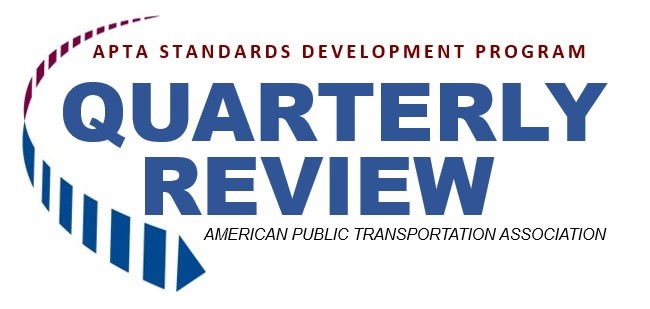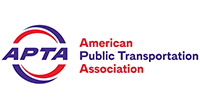
MESSAGE FROM THE CHAIR
Greetings and thank you for your support of APTA’s Standards Development Program. I am excited about leading this effort to bring together a broad range of individuals and organizations from the public transit industry for the development of consensus-based standards and best practices. Although APTA’s members are the principal drivers and beneficiaries of the program, the Standards Program encourages participation from all transit industry stakeholders. This consensus-based approach is essential to the development of APTA standards, which facilitate the establishment of consistent processes and interoperability while reducing risks and costs.
The solutions for the challenges we face in delivering public transportation cannot be developed and maintained in silos or by only a few. Our standards must demonstrate that effective collaboration with all industry stakeholders can work to develop and establish solutions to the collective challenges we face within our industry. I encourage each of you to be part of this solution — help by contributing to working groups, educating yourself and your agency about existing standards, and ensuring that standards are implemented into your agency’s processes. We are much stronger when we work together to face our challenges. The APTA Standards Development Program provides an opportunity for each agency, and person, to be part of this important and essential partnership.
ASSOCIATION NEWS
High-Speed Rail Update
The Federal Railroad Administration (FRA) published a final rule Nov. 21, 2018, amending FRA’s passenger equipment safety standards (49 CFR 238) using a performance-based approach to adopt new and modified requirements governing the construction of conventional and high-speed passenger rail equipment.
This final rule adds a new tier of passenger equipment safety standards (Tier III) to facilitate the safe implementation of nationwide, interoperable high-speed passenger rail service at speeds up to 220 mph. While Tier III trainsets must operate in an exclusive right-of-way without grade crossings at speeds above 125 mph, these trainsets can share the right-of-way with freight trains and other tiers of passenger equipment at speeds not exceeding 125 mph.
The final rule also establishes crashworthiness and occupant protection performance requirements as an alternative to those currently specified for Tier I passenger trainsets. The Tier III requirements and Tier I alternative crashworthiness and occupant protection requirements attempt to remove regulatory barriers and enable use of new technological designs, allowing a more open U.S. rail market. Additionally, the final rule increases the maximum speed for passenger equipment from 150 mph to 160 mph. This helps harmonize these equipment side requirements with the track regulations covered under 49 CFR 213.
Mobility Standards
In July 2018, APTA organized a forum, “The Future of Mobility – From Transit Authority to Mobility Integrator,” to discuss how traditional public transportation modes must adapt to compete in the new mobility marketplace. Several action items were discussed at the summit, including the need for industry standards on the future of mobility.
As a result, the Mobility Management Committee proposed the establishment of a new Mobility Standards Program to the Standards Development and Oversight Council. The Mobility Standards Program will initially explore recommended practices on Mobility-as-a-Service concepts and bundling service, open payment platforms, and a white paper on creating a universal transit app. Other products could include developing an industry recommended practice for building contracts and relationships with Transportation Network Companies (TNCs).
Retiring of Certain APTA Recommended Practices
APTA’s Standards Transit Asset Management Working Group will withdraw documents APTA SGR-TAM-RP-002-13, “Defining a Transit Asset Management Framework to Achieve a State of Good Repair,” and APTA SGR-TAM-RP-003-13, “Capital Asset Inventory and Condition Assessment.” After Feb. 28, 2019, these documents will be available for reference only.
The SGR/TAM working group has voted to retire these documents because these recommended practices are no longer relevant. They were published before FTA published the Final Rule for Transit Asset Management in July 2016 and before the industry knew what would be federally mandated. MAP-21 and the FAST Act required all transit operators to establish a strategic and systematic process of operating, maintaining, and improving public transportation capital assets effectively through their entire life cycle and publish their TAM Plan by October 1, 2018.
Now that this deadline has passed, and all operators have a TAM Plan in place, these recommended practices are no longer appropriate or needed.
STANDARDS DEVELOPMENT PROGRAM
Bus Transit Systems
The Bus Procurement Working Group has resumed its update of the Standard Bus Procurement Guidelines under the direction of a new facilitator and is currently conducting weekly meetings to develop a new section devoted entirely to electric bus procurements. Completion of the final draft is expected by the end of January. The document will be ready for balloting in early March.
The Bus Rapid Transit Working Group met Jan. 9-10 to review five documents and finalize its work plan for 2019. This recently reactivated working group is focused on updating all its documents by the end of the calendar year.
The Brake and Chassis Working Group met Feb. 14–15 at the Pinellas Suncoast Transit Authority facility to continue its update of existing documents. The group is currently balloting two documents that will be ready for public comment in February. This group is looking for a new facilitator starting in March 2019. If you would like to learn more about any of the bus standards development activities or working groups, please contact Lisa Jerram at ljerram@apta.com.
Commuter, High-Speed and Intercity Rail
The Passenger Rail Equipment and Safety Standards (PRESS) program continues to make progress on revisions to several documents. The Mechanical Working Group advanced eight Electronically Controlled Pneumatic (ECP) Passenger Cable-Based Braking Systems documents to public comment in December 2018. These documents will advance to CEO Review this month and are expected to be published in February 2019.
All working groups are actively engaged in completing revisions to existing documents at the Construction and Structural Working Group which met Dec. 12–13, 2018, in Washington, DC. Eight documents related to commuter and intercity railcar construction requirements were reviewed by the group. Additionally, APTA PR-CS-S-034-99, Rev. 2, “Design and Construction of Passenger Railroad Rolling Stock,” was sent to working group ballot. If you would like more information about any of the commuter and intercity rail standards development activities or working groups, please contact Narayana Sundaram at nsundaram@apta.com or Nathan Leventon at nleventon@apta.com.
Rail Transit Systems
The Operating Practices Working Group published four documents this month and advanced five additional documents to public comment. The working group has finalized its work plan for 2019 and will begin working on documents detailed in the plan in February. The Operating Practices Working Group will meet in March 2019 to develop documents addressing the use of drones, requirements for self-reporting and use of train berthing markers at stations.
Security for Transit Systems
The Transportation Security Administration (TSA) has renewed its Other Transaction Authority (OTA) contract with APTA. All security working groups submitted their work plans for the 2019 calendar year by Jan. 31. This funding provides the support to APTA’s Control and Communications Security, Security Emergency Management, Enterprise Cybersecurity, and Infrastructure and Systems Security working groups.
The Security Emergency Management Working Group is currently balloting five documents that will advance to public comment in February. The group continues to update existing documents and is preparing five additional documents for approval.
The Enterprise Cybersecurity Working Group has completed two documents on justifying a transit system cybersecurity program to senior leadership that will be published in February.
Sustainability & Urban Design Standards
The Climate Action Planning Working Group continues to work on updating the “Guidelines for Climate Action Planning” (APTA SUDS-CC-RP0-004-11). The Transit Asset Management Working Group continues to evaluate existing documents to determine whether to reaffirm, revise or withdraw some of the documents under its purview. The group is currently focused on developing a recommended practice for transit asset management software. If you would like more information on the working group or want to get involved, please contact working group advisor Elizabeth Lovinggood at elovinggood@apta.com.
The Urban Design Working Group met at the APTA offices on Feb. 7–8 in Washington, DC. Working group members will discuss new and existing documents on concepts such as universal design, access to stations and stops, and art in transit. The Universal Design Guidelines will explain the concept of universal design and how it relates to public transit. This guideline will challenge agencies and designers to provide better “access” to transit for all users by improving practicality, comfort and feelings of inclusiveness.
Working group members will also discuss a new document on improving access to and from fixed-route stations and stops within a transit catchmen area. If you would like more information on the working group, please contact working group adviser Zach Smith at zsmith@apta.com.
Technology
All technology working groups are anticipated to resume reviewing and updating existing documents in March 2019.
COLLABORATION
More and more, APTA working groups are leveraging technology to develop standards and recommended practices. In 2017, volunteers participating in 27 of 35 working groups modified the procedure for developing/revising documents. Today, APTA’s standards working groups typically conduct monthly web conferences, host one meeting annually and use collaboration websites to develop documents.
This small change has increased productivity by 50 percent and drastically reduced expenses. Volunteers embracing these changes have been able to review and edit existing documents, introduce new topics, and ballot and approve documents online—reserving face-to-face meetings for addressing challenges. Adoption of these newer processes has allowed working groups to streamline the development process and enable APTA to update documents and address new topics more quickly. The program is nimble and perfectly positioned to double its output for the 2019 calendar year.
APTA will soon introduce new host collaboration tools and provide training to working group participants. These new tools will streamline processes and expedite the document development process.
THE ROI
In September 2018, FTA conducted an evaluation of APTA’s Standards Development Program to obtain a snapshot of the program’s effectiveness. Overall, results were positive and clearly demonstrate the value of the program over the past three years. Highlights of data collected include:
- 350 respondents total (inclusive of all industry stakeholders, transit agencies, APTA members and nonmembers)
- 78 percent of respondents reported the adoption and use of APTA standards and/or recommended practices, and 22 percent of respondents reported the use of other industry standards.
- Topics ranked by category and by usage:
- bus
- technology
- transit asset management
- rail
- procurement
- accessibility
- security
- passenger rail equipment safety standards
- sustainability and urban design
- Of the respondents who reported use of APTA standards, 63 percent realized a cost or time savings benefit or value from using these standards, 34 percent were unsure, and 3 percent did not realize savings or value.
- Benefits frequently identified included the following:
- better understanding of a topic or new perspective on an issue
- increased efficiency
- safer work environment
- decrease in risk/liability
- decrease in procurement cost and/or time
- improved policies and programs
- decreased maintenance costs
- new partnerships formed based on recommended practices
- increased security
- decreased training time and/or costs
- Benefits frequently identified included the following:




